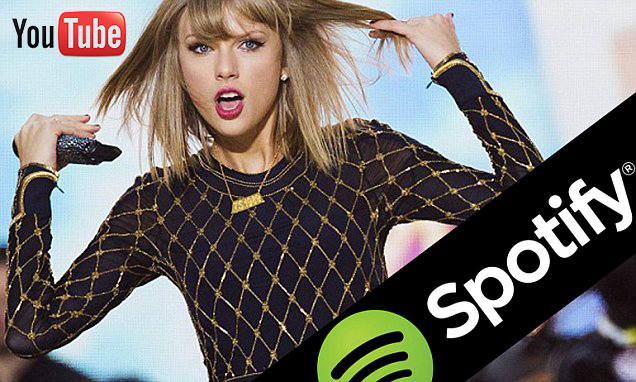
It’s been the dominant news story in music this year. No, not Bono & co. hijacking Apple devices all over the world – earlier this month, Taylor Swift pulled her entire back catalogue from streaming service Spotify.
Following the release of her latest album, ‘1989’, Swift pulled the plug, saying, “On Spotify, they don’t have any settings, or any kind of qualifications for who gets what music. I think that people should feel that there is a value to what musicians have created, and that’s that.”
It’s becoming increasingly clear, however, that Swift’s decision was less for the sake of her art, and more for the sake of her wallet.
British folk artist Billy Bragg claimed her stance against streaming music is simply a veil to discredit Spotify as she moves to become the marquee artist for the upcoming music streaming service YouTube Music Key. The service offers access to the entire Google Play library, as well as music videos and other features.
Swift’s team responded quickly, saying, “Taylor Swift has had absolutely no discussion or agreement of any kind with Google’s new streaming service.” YouTube reiterated this statement, though clarified that Swift’s back-catalogue is available on the service, but only the first two releases of ‘1989’ are available – Shake It Off and Blank Space.
However, Take That were quick to nail their colours to the mast. The band withdrew their new album ‘III’ from Spotify until January, giving the full rights to Google Play.
So, what exactly is the difference between the two models?
Spotify has both free and subscription-based services. Spotify has 50 million users – 12.5 million of those avail of the premium service. Google’s new service will be strictly subscription-based, but YouTube will still offer ad-based access to its content in the same way that Spotify does.
Spotify charges €9.99 for its premium service per month. YouTube’s Music Key will cost $9.99 per month, though early adopted get a six-month free trial, as well as an introductory rate of $7.99 per month thereafter.
“We want to give fans more ways to enjoy music on YouTube, but also give artists more opportunities to connect with fans and earn more revenues,” said Christophe Muller, YouTube’s music partnerships director.
With YouTube Music Key, you will have access to 30+ million songs via Google Play. Spotify boasts the same amount on its press page.
Spotify is available in 58 markets. At this moment in time, YouTube Music Key is available in the US and six European countries only – the UK, Italy, Spain, Portugal, Finland and Ireland.
Paying subscribers of YouTube Music Key will be able to download and play songs and videos on their mobiles and smart devices, even when using other apps. This feature is currently restrictive on Spotify.
Both Spotify and Google’s service insist that labels who add their catalogues must make them available to paying and free users.
YouTube has mostly been viewed as a promotional tool by artists in the past — the site has paid out more than one billion in ad revenue in its lifetime. Spotify has paid $2 billion to the music industry with just 50 million users.
What does this mean for the artists? Artists earn $0.00521 per stream on Spotify, meaning an artist would make just $5,210 from a million streams of a track. It is unclear how much goes to musicians and songwriters. According to Spotify founder Daniel Ek, however, Swift was on track to make to earn close to $6 million from Spotify this year.
While YouTube Music Key’s pay per stream figures have yet to be disclosed, currently, YouTube’s royalty rate stands at $0.00175 per stream, working out at $1,750 for one million streams, albeit from a much more limited service. YouTube payment includes gross payable to single party uploader claiming 100% of rights including video, master and publishers.
Streaming holdout Thom Yorke has expressed a worry, arguing that “artists get paid fuck all.” Foals frontman Yannis Philippakis has echoed his sentiments.
“I’d rather somebody stole the record on vinyl than bought it or streamed it on Spotify”.
YouTube Music Key has the potential to cause a stir in an overcrowded market with its new model. Spotify bosses should be on their toes – although judging from their response to Swift’s departure, they aren’t too worried.
“We hope she’ll change her mind and join us in building a new music economy that works for everyone,” a statement reads on the Spotify website. “We believe fans should be able to listen to music wherever and whenever they want, and that artists have an absolute right to be paid for their work and protected from piracy. That’s why we pay nearly 70% of our revenue back to the music community.”
“PS – Taylor, we were both young when we first saw you, but now there’s more than 40 million of us who want you to stay, stay, stay. It’s a love story, baby, just say, Yes.”
By Fionnuala Jones




Leave a Reply